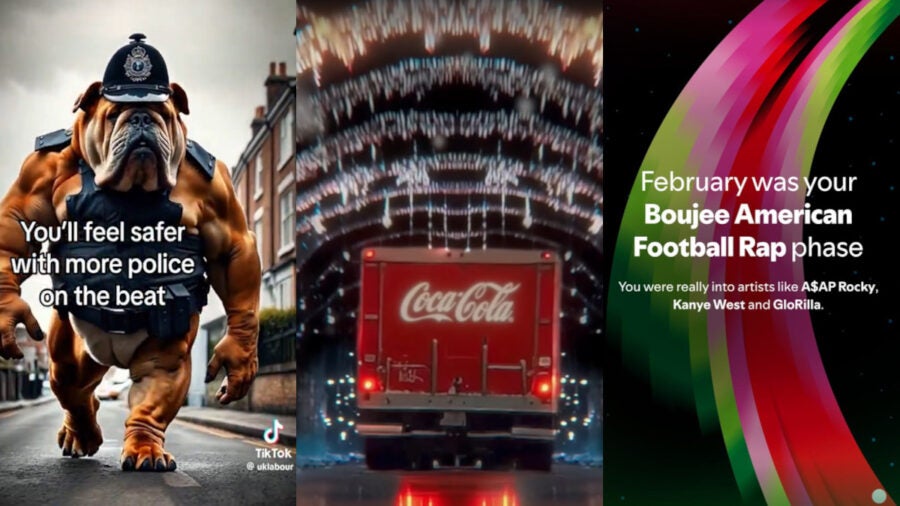
Many Spotify users eagerly await the annual review of their listening habits shown in Spotify Wrapped. These end-of-year recaps are often considered a masterclass in personalised marketing and have helped the streaming company build brand loyalty and inspired other companies outside of the music sector to launch their own data-driven roundups.
But, in 2024, what fans unwrapped was a little underwhelming. Reddit users accused Wrapped 2024 of being ‘AI-generated slop’ – pointing to the made-up genres, such as “Pink Pilates Princess Strut Pop”, as generative AI giveaways. Posts questioning its authenticity were widely shared on X. Similarly, Spotify’s new Wrapped AI podcast feature, where AI podcast ‘hosts’ outline and comment on users’ stats, left listeners cold.
Spotify Wrapped was famously created by an intern. There’s currently no code for that.
Spotify wasn’t the only brand to face backlash from fans due to uses of AI. Coca-Cola had a similar misfire with its AI-generated Christmas ad, which paid homage to its 1995 “Holidays are coming” commercial. The ad, which was created in collaboration with three AI studios, features AI-generated animals and red Coca-Cola lorries. But, instead of reviving the holiday magic of the original commercial, the AI advert sparked backlash online. Not only were the ethics of the endeavour questioned, the advert’s quality was pulled apart and branded ‘soulless’ and ‘devoid of any actual creativity’.
Of course, Spotify and Coca-Cola aren’t alone in receiving criticism for outsourcing creativity to algorithms. Toys “R” Us provoked controversy with an AI-generated ad in April last year. Hipster movie production company A24, meanwhile, was called out for using AI to create promotional posters for Alex Garland’s dystopian film Civil War. This week, the Labour Party has faced criticism for its TikTok video featuring AI-generated animals.
These examples aren’t anomalies and they speak to a larger issue: a fundamental misunderstanding of how to use AI.
AI is a double-edged sword
In the rush to embrace AI, brands risk leaving their critical-thinking skills behind. The public is more concerned with the outcome than the process. Most people aren’t interested in whether the latest cutting-edge systems have been deployed if the result is clumsy, generic and flat.
Consumers are becoming increasingly intolerant of AI-generated missteps, even from their favourite brands. This year’s backlashes highlights a key risk for businesses adopting AI in 2025. Using automation in the wrong places has the power to turn your most loyal fans into vocal critics.
Using AI the right way
But using AI is not a mistake in itself, the problem is how brands choose to harness it. For example, generative AI cannot replace genuine human creativity – it is merely a mulch of previous human ideas. What made Spotify Wrapped genius wasn’t its super-specific genres but its ability to encourage connection and reflection among users. There’s currently no code for that.
Using AI in the wrong places can turn your most loyal fans into vocal critics
This isn’t to say that AI should automatically be removed from the creative sphere. There is a role for technology to play in this space. The key is to apply the right models to the right use cases. For instance, AI can be used to automate repetitive, low-value tasks, freeing up time for teams to focus on high-value, strategic initiatives. By leveraging AI in this way, businesses can enhance productivity, without delegating their most important tasks to tech that isn’t suited to the task.
If brands want to reap the full benefit of AI, they should also take a closer look at their data. Successful AI models run on high-quality, well-governed data, so getting this in order should be top of the agenda for 2025. Businesses should be checking their data is accurately labelled and properly secured, ensuring sensitive data is only accessible to those who need it.
As adoption becomes more widespread, we’re likely to see brands churn out more AI slop. But the future is not without hope. If businesses can learn from their peers’ mistakes and apply AI in the right way, they’ll have an opportunity to enhance their offering, rather than become an example of bad use cases. Wrapped 2024’s end-of-year offering may have been as entertaining as receiving a lump of coal for Christmas, but if Spotify can learn from its misstep, it may prove the greatest gift yet.
Paul Maker is chief technology officer at Aiimi.

Many Spotify users eagerly await the annual review of their listening habits shown in Spotify Wrapped. These end-of-year recaps are often considered a masterclass in personalised marketing and have helped the streaming company build brand loyalty and inspired other companies outside of the music sector to launch their own data-driven roundups.
But, in 2024, what fans unwrapped was a little underwhelming. Reddit users accused Wrapped 2024 of being ‘AI-generated slop’ – pointing to the made-up genres, such as “Pink Pilates Princess Strut Pop”, as generative AI giveaways. Posts questioning its authenticity were widely shared on X. Similarly, Spotify’s new Wrapped AI podcast feature, where AI podcast ‘hosts’ outline and comment on users’ stats, left listeners cold.
Spotify Wrapped was famously created by an intern. There’s currently no code for that.
